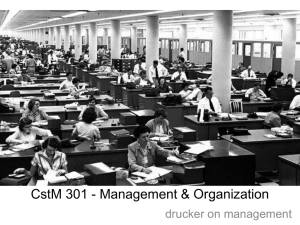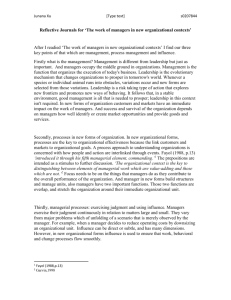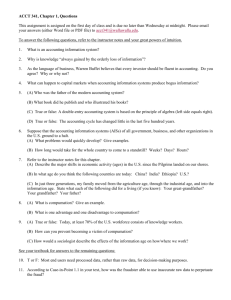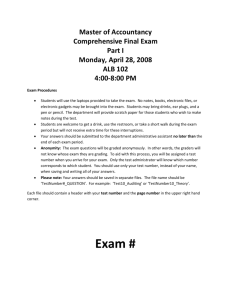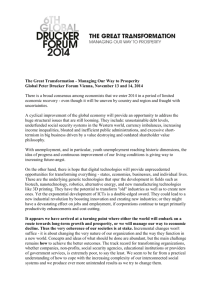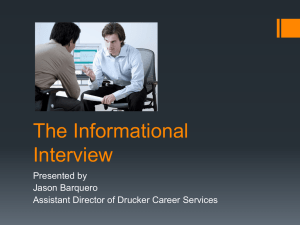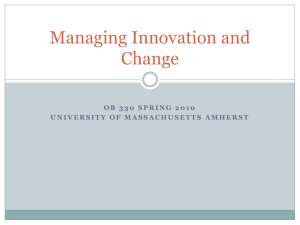Seminar Four
advertisement
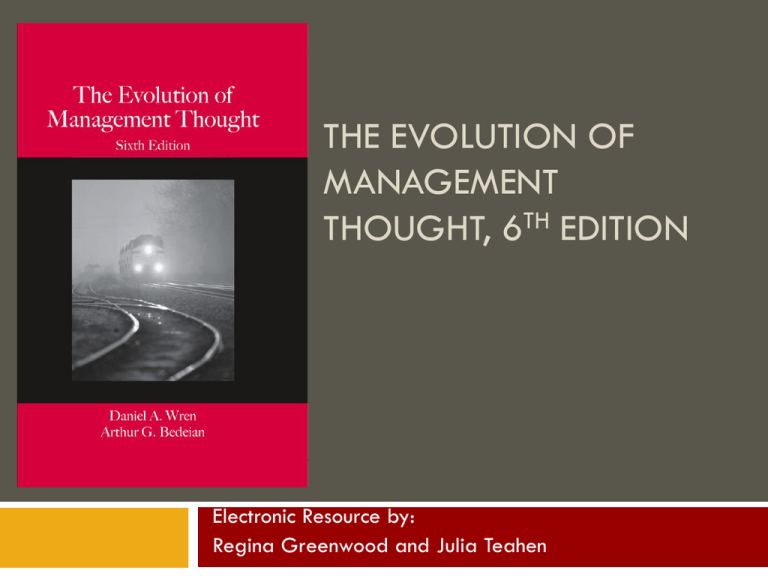
THE EVOLUTION OF MANAGEMENT THOUGHT, 6TH EDITION Electronic Resource by: Regina Greenwood and Julia Teahen Part Four The Modern Era http://www.bigphoto.com/themes/traffic/railway Chapter Nineteen Management Theory and Practice The Modern Era The Renaissance of General Management Fayol’s Intellectual Heirs Management Education Other Views of Managerial Work Peter Drucker: The Guru of Management From Business Policy to Strategic Management Markets and Hierarchies Governance and Agency Issues Management as an Integrating and Innovating Task Strategy and Views of the Firm Strategic Leadership and Evolutionary Dynamics The Renaissance of General Management Henri Fayol – the first to propose a general theory of management The elements of management describing what managers did (plan, organize, command, coordinate, and control). The principles, which were lighthouses, or guides, to how to manage. Fayol’s Intellectual Heirs William Newman (1909-2002) – “the basic objectives of the firm should define its place or niche in the industry, define its social philosophy as a business ‘citizen,’ and serve to establish the general managerial philosophy of the company” (Wren text) George Terry (1909-1979)– first to call his book Principles of Management Harold Koontz (1908-1984) and Cyril O’Donnell (19001976) – defined management as “the function of getting things done through others” in their popular text. Management Education The Gordon and Howell Report 1959 Asked: What are we teaching in business schools and does this prepare our students for a career in a changing environment? Cited the need for more courses in: The humanities and liberal arts. Mathematics. The behavioral and social sciences. Business School Curriculum Compare a pre-1959 Business school curriculum to the current requirements in this business program. Management Theory Jungle Harold Koontz (1908-1984) Six Different Schools – management process, empirical, human behavior, social system, decision theory, mathematical schools. Each can contribute, but some are “tools.” Causes of confusion and the “jungle warfare” “The semantics jungle” Problems in defining management as a body of knowledge The misunderstanding of principles through trying to disprove an entire framework of principles when one principle was violated in practice Inability or unwillingness of management theorists to understand each other. Other Views of Managerial Work Henry Mintzberg Courtesy of McGill University Henry Mintzberg (1939- observed five executives and concluded mangers perform ten roles within three categories: interpersonal, informational, and decisional. Other Views of Managerial Work Rosemary Stewart examined the "demands," "constraints," and "choices” of a managers job. John Kotter's studies of general managers and his finding of certain "demands" or regularities in all general managers' jobs that resemble traditional management functions. Note, also, the factors that cause these to vary. Other Views of Managerial Work Richard M. Hodgetts Fred Luthans, Richard Hodgetts, and Stuart Rosenkrantz studied 44 managers, recording activities and behaviors. In Real Managers, 1988, they note four categories: Routine communication, traditional management, networking, and human resource management. The Search for Excellence Thomas Peters and Robert Waterman identified eight attributes of corporate excellence in their best selling book, In Search of Excellence. Peters and Waterman relied solely on financial measures in Management Education Revisited Harold Koontz revisited the management theory jungle and expanded it from 6 to 11 approaches. Called for leading managers to narrow the gap between professional practice and business schools. Lyman Porter and Lawrence McKibbin surveyed management education for the AACSB. Called for professors to be more broadly educated and possess relevant work experience. Peter Drucker (1909 – 2005) Guru of Management Practice Drucker achieved prominence through his writings and consulting. He asks: What is our business? Who I the customer? What does the customer buy? What does the customer consider value? What will our business be? And what should it be? Peter Drucker (1909 – 2005) Guru of Management Practice Importance on Innovation Key areas for setting objectives and evaluating results Fortune magazine publishes a survey of the most “admired” corporations. The areas that Fortune uses bear a strong resemblance to Drucker’s key areas. Management by Objectives Peter Drucker (1909 – 2005) Guru of Management Practice Drucker’s focus on managerial practice asks the lingering question: “Can our academic research have rigor and also be relevant to the practice of management?” From Business Policy to Strategic Management Ronald Coase Markets and hierarchy Echoing the work of earlier economists such as Say and Marshall, who saw management as a factor of production and able to provide competitive advantage, Ronald Coase, in a 1937 article, asked why have business firms? Coase saw the firm as an alternative to the market with certain advantages in allocating resources. From Business Policy to Strategic Management Oliver Williamson (1932-) and the “new institutional economics” saw the hierarchy of the firm being typically more efficient than markets because firms could internalize transaction costs and provide monitoring mechanisms to thwart, hopefully, opportunism. Oliver Williamson From Business Policy to Strategic Management Governance and Agency Issues If the firm, through management, is more efficient than the market, then the actions of those who govern the firm becomes more significant. A number of individuals, such as Michael Jensen, criticize the behavior of those in the managerial hierarchy who serve their own interests rather than those of their shareholders. The separation of ownership and control is an evergreen issue to catch the conscience that lies within. From Business Policy to Strategic Management Agency theory… assuming it is a theory, creates situations that lead to opportunistic behavior. Assumes that everyone will engage in opportunistic behavior—leading to contracts and other means of monitoring behavior. Involves issues of trust, fidelity, and other appropriate behaviors in contrast to the assumptions of agency theory. Assumptions How do our assumptions about the behavior of others influence how we manage? Management as an Integrating and Innovative Task Henri Fayol Henri Fayol was a strategist. Arch Shaw (1876-1962) pioneered the study of business policy as a academic subject at Northwestern University. Management as an Integrating and Innovative Task Alfred D. Chandler, Courtesy of Harvard Business School There is a rich heritage of “strategy” in Barnard, Newman, Drucker, and Chandler. Strategic management has emerged as the “new” view of business policy and long range planning. From Business Policy to Strategic Management Strategy and Views of the Firm Michael Porter (and others) in industrial/organization al economics made key contributions to strategy. Porter’s “five forces” framework, value chain and “generic” strategies. Michael E. Porter, Courtesy of Harvard Business School From Business Policy to Strategic Management Strategy and Views of the Firm Edith Penrose (1914-1996) asked why firms differed in performance, providing seminal insights for the resource based and the knowledge based views of the firm. SWOT— In 1960s HBS policy group began use of the term. Important developments in “core competencies” and “distinctive competencies” followed through the work of Wernerfelt, Rumelt, Barney, Prahalad, and Hamel. From Business Policy to Strategic Management Strategic Leadership and Evolutionary Dynamics “Evolutionary economics”—how to create and gain competitive advantages through innovation. Organizational learning to “unbound” rationality and move to new and innovative forms of competitive advantage. Strategic leadership—the bridge to general management theory. Summary General management theory reawakened as organizations grew more complex and needed more broadly educated general managers. Drucker and others emphasized the need to improve the practice of management. General management also grew through a resurgence in industrial/organizational economics. Business policy evolved to strategic management.
